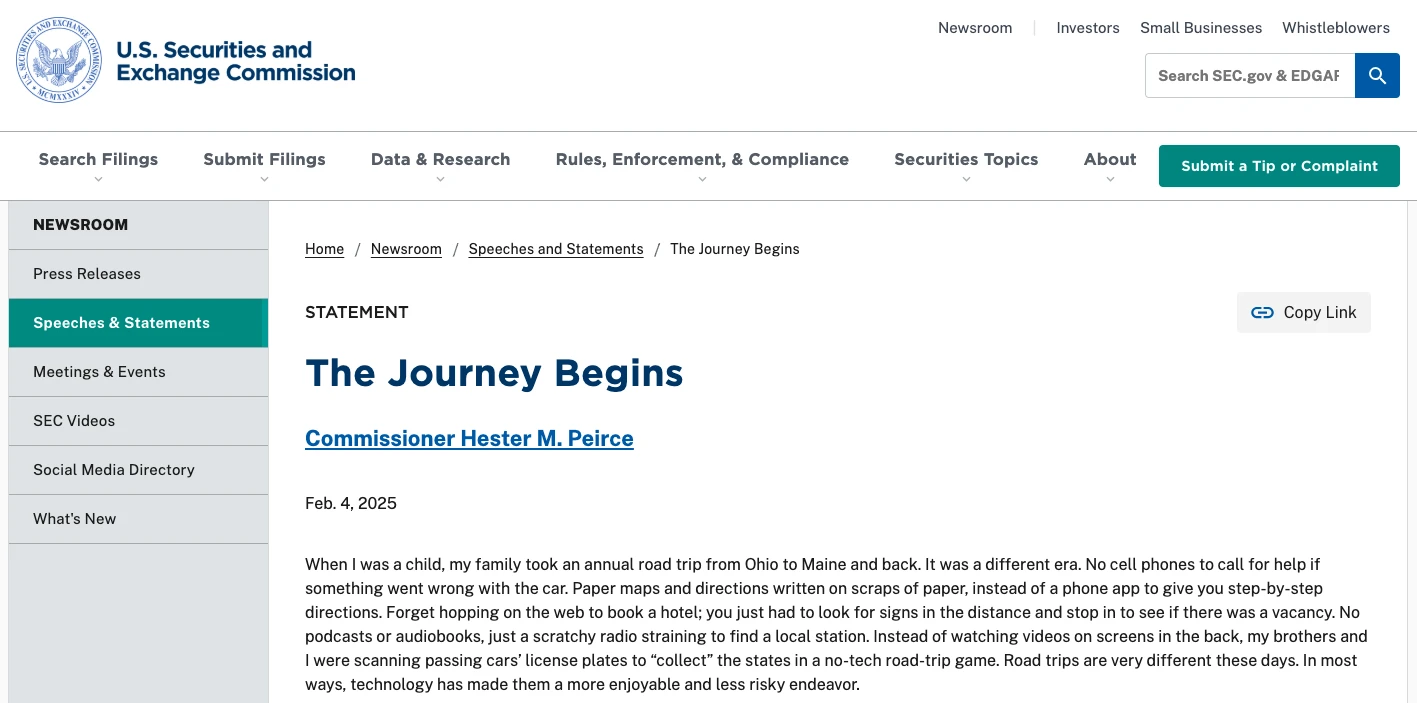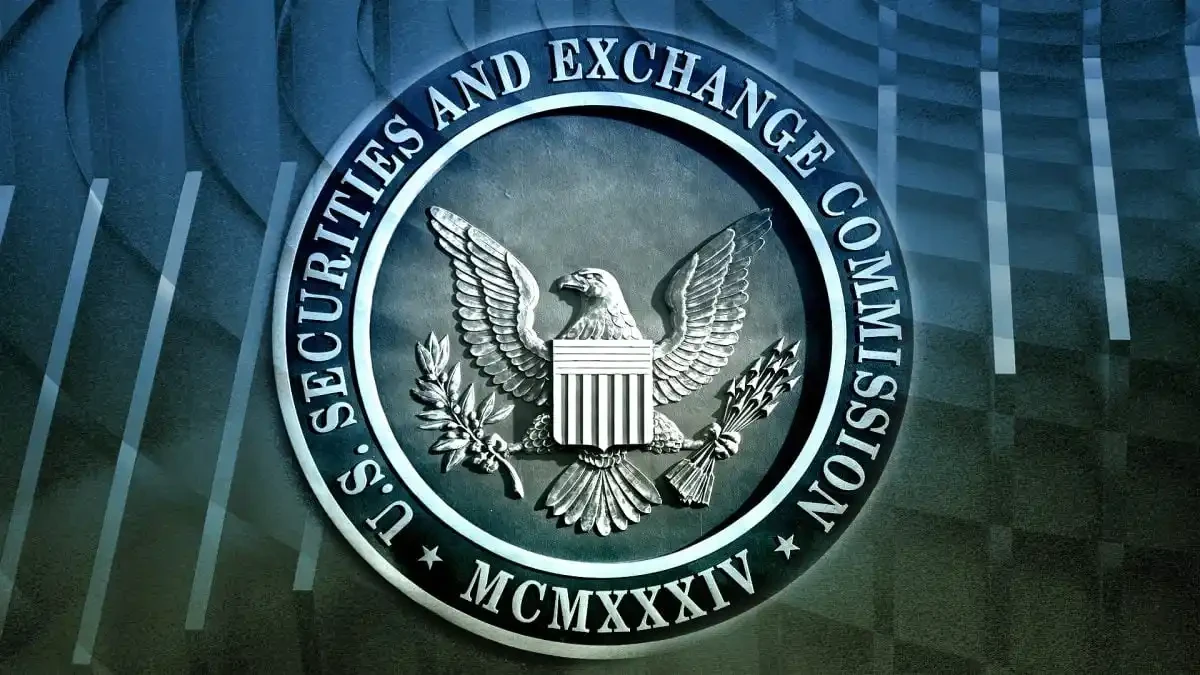On February 4, 2025, the U.S. Securities and Exchange Commission (SEC) released the work plan for its cryptocurrency working group, marking a significant transformation in the U.S. regulatory landscape for cryptocurrencies. This working group aims to bring more clarity to the regulatory framework for crypto assets while maintaining support for innovation. Over the past decade, the SEC has often faced criticism for its performance in cryptocurrency regulation, primarily due to a lack of clear rules and uncertainty in enforcement. The newly established working group hopes to guide the cryptocurrency industry toward a more mature and regulated future through a more systematic and transparent approach.

https://www.sec.gov/newsroom/speeches-statements/peirce-journey-begins-020425
This article will provide a detailed interpretation of the goals, key initiatives of the newly established SEC cryptocurrency working group, and its potential impact on the cryptocurrency industry and market participants, particularly how the proposal for a cross-border sandbox can provide new opportunities for global crypto projects.
Background and Core Mission of the SEC Cryptocurrency Working Group
Since the birth of Bitcoin, the SEC has been in contact with the cryptocurrency industry for over a decade. From the first application for a Bitcoin exchange-traded product in 2013 to the DAO report released in 2017, and a series of enforcement actions and policy statements, the SEC's regulatory actions regarding cryptocurrencies have often been fragmented and vague. Although the U.S. securities market is widely praised for its regulatory nature and transparency, the SEC has consistently failed to establish a systematic regulatory framework for this emerging field. Coupled with the fact that many crypto projects exist in a legal gray area, the compliance costs and uncertainties for industry participants have increased, negatively impacting the healthy development of the market.
Against this backdrop, the SEC announced the establishment of the cryptocurrency working group, aiming to address the legal uncertainties faced by the industry in a systematic manner and enhance the transparency and predictability of regulation. The primary task of this working group is to address the status of crypto assets under securities law, clarifying which crypto assets should be classified as securities and which should not, and based on this, develop corresponding regulatory rules.
The core mission of the working group includes:
Clarifying the legal status of cryptocurrencies: Determining which cryptocurrencies are classified as securities and which are not.
Combating fraud: Ensuring market fairness and preventing fraudsters from exploiting cryptocurrencies for illegal activities.
Promoting innovation: Providing more space for experimentation and innovation in the industry while protecting investors.
Commissioner Peirce outlined six principles that the working group will follow, laying the foundation for future regulatory work:
Independence: The working group's work will be based on the SEC's statutory authority while collaborating with other regulatory agencies.
Gradual progress: The complexity of cryptocurrency regulation necessitates that reforms take time, and the working group will proceed in an orderly and lawful manner.
Balance of freedom and protection: While encouraging innovation, ensuring that the market is not eroded by fraudulent activities.
Compliance and flexibility: The working group will utilize existing exemptions and other tools to provide compliance pathways for the industry.
Efficient processing of applications: The working group will expedite the processing of exemption applications, no-action letters, and registration statements, but will require applicants to provide detailed legal analysis and technical support.
No endorsement policy: The SEC will not provide official endorsements for any cryptocurrency or token, and investors must bear their own risks.
Clarifying Regulatory Pathways, Promoting Industry Compliance and Innovation
The working group will focus on several areas, including: clarifying whether different types of cryptocurrencies are classified as securities, which is key to resolving other regulatory issues; providing legal certainty for specific cryptocurrency projects through no-action letters; exploring temporary exemptions for token issuance and simplifying registration pathways (such as Regulation A and crowdfunding rules); providing compliant cryptocurrency custody solutions for investment advisors and brokers; clarifying whether crypto lending and staking are subject to securities law and developing relevant rules, etc.
An important initiative of the SEC cryptocurrency working group is considering the introduction of a cross-border sandbox. The core idea of this proposal is to provide a controlled experimental environment for international crypto projects, where projects can conduct limited trials under different countries' regulatory frameworks. This proposal is expected to offer greater flexibility for global crypto projects, especially in effectively promoting innovation in response to varying regulatory requirements across different countries and regions.
The cross-border sandbox has two main advantages:
Global collaboration and experimentation: Given the decentralized and global nature of cryptocurrencies, many crypto projects need to operate in multiple countries and regions. Existing single-country regulatory frameworks often cannot effectively address the challenges faced by cross-border crypto projects. Through the cross-border sandbox, regulatory agencies can collaborate with international counterparts to explore feasible regulatory solutions, providing more experimental opportunities for global crypto projects.
Risk management: The cross-border sandbox provides a controlled environment for crypto projects, allowing innovation in cryptocurrencies while ensuring market stability and investor protection. It not only helps regulators better understand the innovations in cryptocurrency technology but also ensures consistency and effectiveness of new regulatory measures on a global scale.
Core Tasks and Challenges of Cryptocurrency Regulation
Although the establishment of the SEC cryptocurrency working group brings hope to the cryptocurrency industry, the challenges it faces remain significant. The SEC has made it clear in its announcement that developing a clear regulatory framework for crypto assets is not an overnight task. The SEC has had multiple interactions with the cryptocurrency industry over the past decade, but each action has been fragmented, leading to uncertainty in the industry. Now, the working group's goal is to address the following key issues through a more systematic and comprehensive approach:
1. Determining the securities status of crypto assets
Whether crypto assets are classified as securities is one of the biggest legal challenges faced by many crypto projects. According to U.S. securities law, the definition of securities includes stocks, bonds, investment contracts, etc., but there has long been no clear standard for whether cryptocurrencies fit this definition. The SEC working group will focus on examining the nature of various crypto assets, attempting to classify these assets and provide specific regulatory measures. For example, certain tokens may be considered securities and need to comply with securities law, while others may not meet the definition of securities and thus not be subject to securities law regulation.
2. Compliance of crypto token issuance and trading
The issuance and trading of crypto tokens are core activities in the crypto industry, but due to a lack of clear rules, many projects face legal risks in this area. The SEC working group is considering providing a temporary tax exemption mechanism for token issuance, allowing issuers to provide specific information disclosures and ensuring that this information is continuously updated to help investors make more informed decisions. At the same time, the working group also plans to review existing token exchanges and trading products to clarify which exchanges meet regulatory requirements and which may face compliance issues.
3. Compliance of crypto lending and staking businesses
In recent years, crypto lending and staking have become increasingly popular in the cryptocurrency market. However, whether these businesses are subject to securities law regulation and how to conduct them legally and compliantly remains an unresolved issue. The SEC working group has stated that it will strive to provide more legal guidance for crypto lending and staking businesses to ensure that these activities comply with relevant U.S. securities laws while encouraging innovation.
Strategic Direction and Industry Collaboration of the SEC Working Group
The strategic direction of the SEC cryptocurrency working group is clear: to protect investors while encouraging innovation. Members of the working group have stated that their goal is to provide a framework for the cryptocurrency market that meets regulatory requirements and is conducive to industry development. This framework not only involves the SEC's responsibilities but also requires collaboration with other regulatory agencies to ensure compliance of cryptocurrencies on a global scale.
The working group emphasizes that while promoting innovation, it must prevent the cryptocurrency market from becoming a breeding ground for fraudulent activities. The SEC has the authority to enforce actions against suspected fraudulent behavior, but for cases outside its jurisdiction, the working group can refer them to relevant regulatory agencies or report to Congress. Ensuring market transparency and fairness is a consistent goal of the SEC.

Future Outlook: The Far-reaching Impact of the SEC Cryptocurrency Working Group
The establishment of the SEC cryptocurrency working group undoubtedly brings new opportunities to the cryptocurrency industry. With the proposal for a cross-border sandbox, international collaboration and regulatory coordination will become key to future development. This not only provides greater development space for global crypto projects but also helps address compliance challenges within the industry.
Although the SEC acknowledges that resolving existing issues is not an easy task, through collaboration with builders, investors, and other regulatory agencies within the industry, a clear and effective regulatory framework for cryptocurrencies can ultimately be established. The SEC hopes that through this new working group, it can provide clearer rules for the cryptocurrency industry in the coming years, ensuring the healthy development of the sector.
Ultimately, as the regulatory environment improves, the cryptocurrency industry will be able to develop in a more transparent and predictable environment, providing global investors with more innovative opportunities.
免责声明:本文章仅代表作者个人观点,不代表本平台的立场和观点。本文章仅供信息分享,不构成对任何人的任何投资建议。用户与作者之间的任何争议,与本平台无关。如网页中刊载的文章或图片涉及侵权,请提供相关的权利证明和身份证明发送邮件到support@aicoin.com,本平台相关工作人员将会进行核查。



